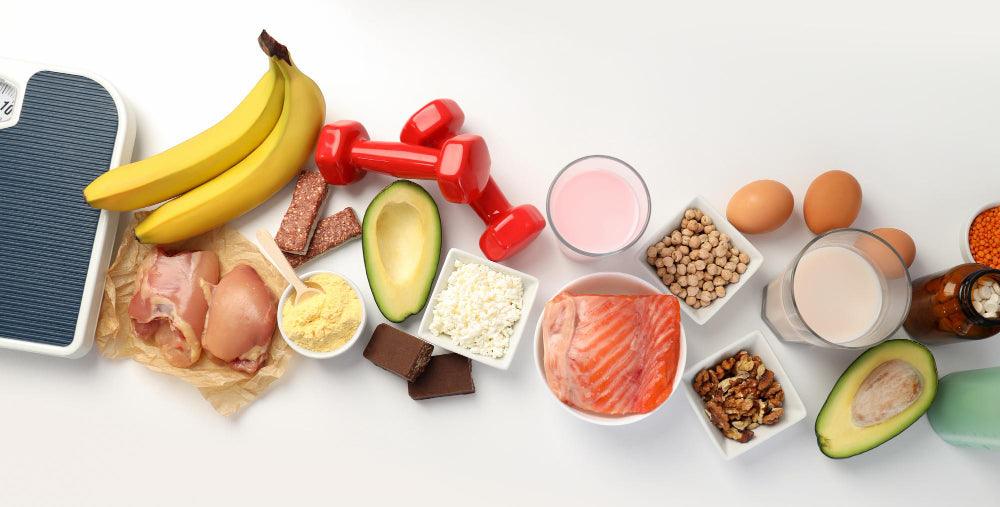Is clean bulking healthy?


A balanced diet along with a consistent exercise routine (a good combination of cardio and strength training) can lead to a host of benefits such as better physical, mental health and well-being.
This type of lifestyle has been avidly recommended by a wide range of medical professionals and services, such as the NHS.
A healthy, balanced diet should include the following:

Furthermore, the National Library of Medicine suggests that your diet should consist of around:
Moreover, according to the British Heart Foundation, most adults need a daily intake of around 0.75 grams of protein per kilo of body weight. For men, this is 55g; for women, it’s 45g. This is equivalent to around two palm-sized portions of meat, fish, tofu or nuts each day.
However, in the UK, studies show that on average we consume almost double the protein we need. This is not always detrimental but depends on what type of protein you consume. Diets that consist of eating a lot of meat products are linked to heart diseases, diabetes, cancer and a shorter life span.
This can the case for bodybuilders, who often go through periods of “bulking” and therefore consume higher amounts of protein. In some cases, their protein solely comes from meat products, which can affect their overall health. Sometimes, this can contribute to long-lasting health issues.
This article should give you a wider understanding of “clean bulking”, a specific body-building diet. The following information will also give you an understanding of its various advantages and risks.
Bulking is a well-known term in the bodybuilding community. It generally refers to a phase of around four to six months, in which the main goal is to gain muscle.
During this period, you’re supposed to consume more calories than your body needs. These extra calories should provide the necessary fuel, which would help boost muscle size and strength when weight training.
During a typical bulk, it is recommended that first, you should determine your maintenance calories (your usual daily calorie intake). Then, you would need to add around 10 to 20% of your calorie intake to your daily food consumption, taking you into a calorie surplus. You would eventually have to aim for a daily protein intake of 1.6 to 2.2 grams of protein per kilo of body weight.
Bulking is often divided into two different diets: clean bulking and dirty bulking. These both use a calorie surplus but differ in fundamental ways. The dirty bulk typically involves eating a range of high-calorie foods, such as greasy, fatty and junk foods. A clean bulk, on the other hand, consists of a more moderate increase in calories and consists of healthier foods.

Clean bulking, also known as “lean bulking” refers to a diet which is designed to gain more muscle mass rather than fat and mainly consists of nutrient-dense whole foods which give more nutrients than a dirty bulk. It focuses on unprocessed foods and typically avoids high-fat, sugary and calorific foods.
The recommended foods for a clean bulk range from:
This diet approach focuses on consuming a calorie surplus but it doesn’t typically go greater than 500 calories above the average daily calorie intake.
Usually, adding more calories into your diet leads to weight gain which can have unhealthy side effects. Overeating can also lead to high cholesterol, blood sugar and other health-related issues. This is the case for people following dirty bulks for an extended period of time.
Even if a dirty bulk is in fact effective for gaining muscle and strength at a rapid rate, its side effects are: excessive fat gain, high cholesterol and blood sugar levels and feelings of sluggishness. Studies have also shown that diets high in simple carbs (such as a typical dirty bulk) can even lead to an increase in fatigue and symptoms of depression.
Contrary to a dirty bulk, a clean bulk has the advantage of gaining the wanted muscle weight while at the same time maintaining good health. The lean bulk is mainly comprised of whole foods and is rich in vitamins, minerals and fibres.
Diets containing high amounts of fibre (like the clean bulk) are also linked to good digestive health and a reduced risk of ailments such as type 2 diabetes, heart disease and cancer.
Clean bulking requires more planning and discipline. Trying to increase a specific amount of calories every day can be quite challenging, especially when trying to avoid unwanted fat gain. So, lean bulking is more time-consuming and usually more expensive. This can negatively affect your overall mental health.
Eating in this restrictive way can promote disordered eating (although not all people who bulk struggle with an eating disorder). A study has even shown that more than one in five males who would engage in muscle-building or bulking behaviours had one or more symptoms of muscularity-related eating disorders.

Clean bulking is an eating pattern which consists of an increase in calories to help build muscle mass and strength. Although it is a healthy diet (and much better than dirty bulking for your overall health), it requires more time and attention. Therefore, this can be difficult for your mental well-being.
When on a lean bulk, you should also be careful to not get your protein solely from meat, as this can also contribute to long-lasting health issues.
You should check with your healthcare provider before starting a lean bulk, especially if you have underlying health conditions.
Here at Welzo, we can help you with your dietary intake or monitoring. Our extensive range of vitamin and mineral blood tests are a great way of keeping
For more information concerning men’s health and well-being, please visit our Welzo Health Hub.










Plus get the inside scoop on our latest content and updates in our monthly newsletter.